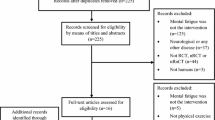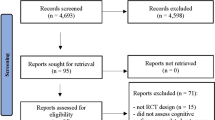Abstract
Thermal stress has a negative effect on the cognitive performance of military personnel and industry workers exposed to extreme environments. However, no studies have investigated the effects of environmental thermal stress on the cognitive functions of older adults. We carried out a controlled trial with 68 healthy older adults (mean age 73.3 years, 69 % female), each of whom has been assessed twice on the same day with selected tests from the Cambridge Neuropsychological Test Automated Battery (CANTAB). Repeated sessions were conducted with air temperatures set at 24 °C and 32 °C in a balanced order. Our primary analyses did not show significant differences when comparing the cognitive performance of the total sample under the two experimental temperatures. However, interaction analysis has shown that humidity levels modify the effect of temperature on cognitive outcomes. The subgroup exposed to relative humidity greater than the median value (57.8 %) presented worse cognitive performance in the heat session when compared to the control session. Reported exercising frequency explained individual vulnerability to heat stress. Volunteers with lower levels of physical activity (<4 times per week) were more likely to present worsened cognitive performance under heat stress. In a fully adjusted linear regression model, the performance under heat stress remained associated with relative humidity (β = −0.21; p = 0.007) and frequency of exercising (β = 0.18; p = 0.020). Our results indicate that heat stress may have detrimental effects on the cognitive functioning of some subgroups of older adults and under particular circumstances. Further research is needed for exploring a variety of potentially influential factors.

Similar content being viewed by others
References
Blatteis CM (2012) Age-dependent changes in temperature regulation. Gerontology 58(4):289–295
Campbell GC, Norman JM (1998) An introduction to environmental biophysics. Springer-Verlag, New York
Drag LL, Bieliauskas LA (2010) Contemporary review 2009: cognitive aging. J Geriatr Psychiatry Neurol 23(2):75–93
Falleti MG, Maruff P, Collie A, Darby DG (2006) Practice effects associated with the repeated assessment of cognitive function using the CogState battery at 10-minute, one week and one month test-retest intervals. J Clin Exp Neuropsychol 28(7):1095–112
Folstein MF, Folstein SE, McHuch PR (1975) “Mini-mental state”. A practical method for grading the cognitive state of patients for the clinician. J Psychiatr Res 12(3):189–198
Gaoua N (2010) Cognitive function in hot environments: a question of methodology. Scand J Med Sci Sports 20(Suppl 3):60–70
Gaoua N, Racinais S, Grantham J (2011) Alterations in cognitive performance during passive hyperthermia are task dependent. Int J Hyperth 27(1):1–9
Gaoua N, Grantham J, Racinais S, Massioui FE (2012) Sensory displeasure reduces complex cognitive performance in the heat. J Environ Psychol 32:158–163
Guergova S, Dufour A (2011) Thermal sensitivity in the elderly: a review. Ageing Res Rev 10:80–92
Hancock PA, Ross JM, Szalma JL (2007) A meta-analysis of performance response under thermal stressors. Hum Factors 49(5):851–877
Hocking C, Silberstein RB, Lau WM, Stough C, Roberts W (2001) Evaluation of cognitive performance in the heat by functional brain imaging and psychometric testing. Comp Biochem Physiol A Mol Integr Physiol 128:719–734
Holowatz LA, Kenney WL (2010) Peripheral mechanisms of thermoregulatory control of skin blood flow in aged humans. J Appl Physiol 109:1538–1544
Inoue Y, Kuwahara T, Araki T (2004) Maturation and aging-related changes in heat loss effector function. J Physiol Anthropol Appl Hum Sci 23:289–294
International Organization for Standardization. ISO 9241 Ergonomic requirements for office work with visual display terminals (VDTs). Part 6: guidance on the work environment.
IPCC (2013) Summary for policymakers. In: Stocker TF, Qin D, Plattner G-K, Tignor M, Allen SK, Boschung J, Nauels A, Xia Y, Bex V, Midgley PM (eds) Contribution of Working Group I to the Fifth Assessment Report of the Intergovernmental Panel on Climate Change. University Press, Cambridge
Jager CA, Milwain E, Budge M (2002) Early detection of isolated memory deficits in the elderly: the need for more sensitive neuropsychological tests. Psychol Med 32(3):483–491
Jones RN, Fong TG, Metzger E, TulebaevS YFM, Alsop DC, Marcantonio ER, Cupples LA, Gottlieb G, Inouye SK (2010) Aging, brain disease and reserve: implications for delirium. Am J Geriatr Psychiatr 18(2):117–127
Kenney WL, Munce TA (2003) Invited review: aging and human temperature regulation. J Appl Physiol 95:2598–2603
Lowe C, Rabbitt P (1998) Test/re-test reliability of the CANTAB and ISPOCD neuropsychological batteries: theoretical and practical issues. Neuropsychologia 36(9):915–923
Mavrogianni A, Wilkinson P, Davies M, Biddulph P, Oikonomou E (2012) Building characteristics as determinants of propensity to high indoor summer temperatures in London dwellings. Build Environ 55:117–130
Minson CT, Wladkowski SL, Cardell AF, Pawelczyk JA, Kenney WL (1998) Age alters the cardiovascular response to direct passive heating. J Appl Physiol 84:1323–1332
Missenard FA (1933) Etude physiologique et technique de la ventilation. Encyclopédie industrielle et commerciale. Eyrolles, Paris
Moyen NE, Ellis CL, Ciccone AB, Thurston TS, Cochrane KC, Brown LE, Coburn JW, Judelson DA (2014) Increasing relative humidity impacts low-intensity exercise in the heat. Aviat Space Environ Med 85(2):112–119
Nedel AS, Gonçalves FLT, Cardoso MRA (2009) Evaluation of thermal simulation of households in the metropolitan region of São Paulo, Brazil. Ecotoxicology 18(8):1143–9
Pilcher JJ, Nadler E, Busch C (2002) Effects of hot and cold temperature exposure on performance: a meta-analytic review. Ergonomics 45:682–698
Racinais S, Gaoua N, Grantham J (2008) Hyperthermia impairs short-term memory and peripheral motor drive transmission. J Physiol 586(19):4751–4762
Radakovic SS, Maric J, Surbatovic M, Radjen S, Stefanova E, Stankovic N, Filipovic N (2007) Effects of acclimation on cognitive performance in soldiers during exertional heat stress. Mil Med 172:133–136
Simmons SE, Saxby BK, McGlone FP, Jones DA (2008) The effect of passive heating and head cooling on perception, cardiovascular function and cognitive performance in the heat. Eur J Appl Physiol 104(2):271–280
Stern Y (2002) What is cognitive reserve? Theory and research application of the reserve concept. J Int Neuropsychol Soc 8:448–460
Sun G, Qian S, Jiang Q, Liu K, Li B, Li M, Zhao L, Zhou Z, von Deneen KM, Liu Y (2013) Hyperthermia-induced disruption of functional connectivity in the human brain network. PLoS One 8(4):e61157
Tong S, Mackenzie J, Pitman AJ, FitzGerald G, Nicholls N, Selvey L (2008) Global climate change: time to mainstream health risks and their prevention on the medical research and policy agenda. Intern Med J 38(6):445–447
United Nations Population Fund (UNFPA) and HelpAge International (2012) Ageing in the twenty-first century: a celebration and a challenge - executive summary
Wunderlich CA (1869) The course of the temperature in disease: a guide to clinical thermometry. Am J Med Sci 57:425–447
Yesavage JA, Brink TL, Rose TL, Lum O, Huang V, Adey M, Leirer VO (1983) Development and validation of a geriatric depression screening scale: a preliminary report. J Psychiatr Res 17(1):37–49
Disclosure
The authors declare that they have no competing interests.
Funding
This study received financial support from Fundação de Amparo à Pesquisa do Estado de São Paulo (FAPESP; grant number 2008-57717-6) and Conselho Nacional de Desenvolvimento Científico e Tecnológico (CNPq; grant number 573813/2008-6).
Author information
Authors and Affiliations
Corresponding author
About this article
Cite this article
Trezza, B.M., Apolinario, D., de Oliveira, R.S. et al. Environmental heat exposure and cognitive performance in older adults: a controlled trial. AGE 37, 43 (2015). https://doi.org/10.1007/s11357-015-9783-z
Received:
Accepted:
Published:
DOI: https://doi.org/10.1007/s11357-015-9783-z




